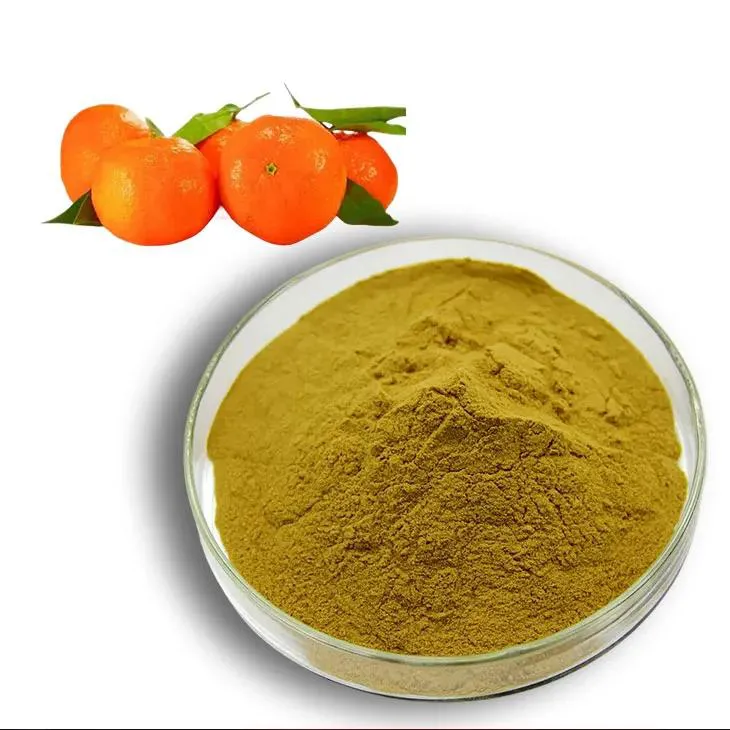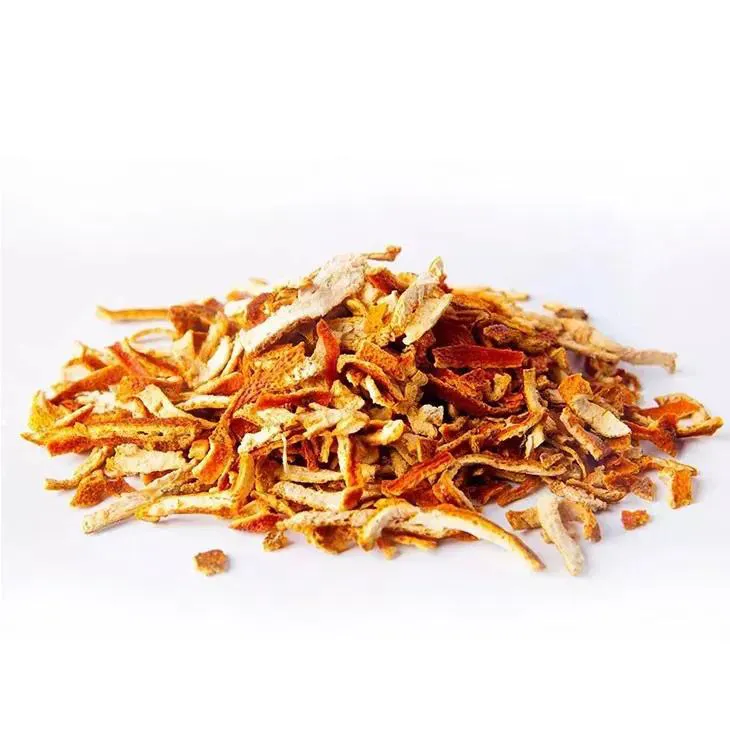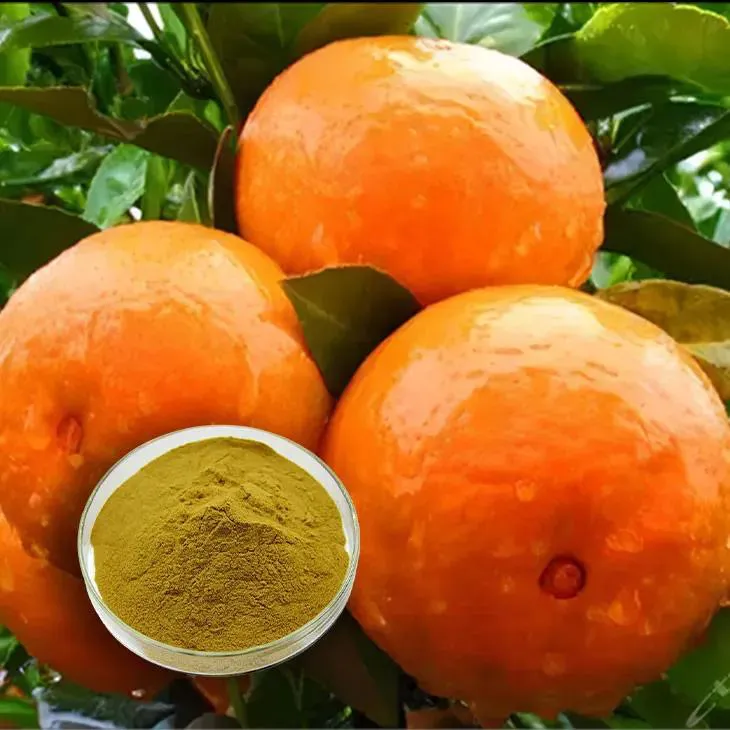- 0086-571-85302990
- sales@greenskybio.com
Organic Citrus Bioflavonoids in Australia.
2024-11-30

Introduction
Australia is widely recognized for its high - quality organic citrus production. Citrus fruits, including oranges, lemons, and grapefruits, are not only delicious but also a rich source of bioflavonoids. These bioflavonoids are bioactive compounds that have emerged as a significant area of interest in the field of nutrition due to their numerous health - promoting properties.

What are Bioflavonoids?
Bioflavonoids, also known as flavonoids, are a class of plant - based compounds that are found in a variety of fruits, vegetables, and herbs. In the context of citrus fruits, they are present in relatively high concentrations. These compounds are known for their antioxidant, anti - inflammatory, and immune - boosting properties.
Antioxidant Properties
Antioxidants play a crucial role in the body by neutralizing free radicals. Free radicals are unstable molecules that can cause damage to cells, DNA, and proteins. Bioflavonoids act as antioxidants by donating electrons to these free radicals, thereby preventing them from causing harm. This antioxidant activity is associated with a reduced risk of chronic diseases such as cancer, heart disease, and neurodegenerative disorders.
Anti - Inflammatory Effects
Chronic inflammation is a key factor in the development of many diseases. Bioflavonoids have been shown to possess anti - inflammatory properties by modulating the body's inflammatory response. They can inhibit the production of inflammatory mediators such as cytokines and prostaglandins, which helps to reduce inflammation in the body.
Immune - Boosting Capabilities
A healthy immune system is essential for defending the body against pathogens. Bioflavonoids can enhance the immune system by stimulating the production of immune cells such as white blood cells. Additionally, they can also improve the function of the immune cells, making them more effective at fighting off infections.

Citrus bioflavonoids in Australia
Australia's unique climate provides ideal conditions for citrus cultivation. The warm, sunny days and cool nights are conducive to the growth of citrus trees, resulting in high - quality fruits. Moreover, the country has strict organic farming regulations that ensure the production of citrus fruits that are not only rich in bioflavonoids but also free from harmful pesticides and chemicals.
Types of Citrus bioflavonoids
There are several types of bioflavonoids found in citrus fruits in Australia. One of the most well - known is Hesperidin, which is predominantly found in oranges. Hesperidin has been extensively studied for its role in maintaining cardiovascular health. It can help to lower blood pressure, reduce cholesterol levels, and improve the function of blood vessels.
Another important bioflavonoid is naringenin, which is present in grapefruits. Naringenin has been shown to have anti - diabetic properties by improving insulin sensitivity and regulating blood sugar levels.
Lemons contain bioflavonoids such as eriocitrin, which has antioxidant and anti - inflammatory properties. These bioflavonoids contribute to the overall health benefits associated with lemon consumption.

The Role of Organic Farming
Organic farming methods play a crucial role in the production of citrus fruits rich in bioflavonoids in Australia.
Preserving Bioflavonoid Integrity
Organic farming avoids the use of synthetic fertilizers and pesticides, which can potentially disrupt the natural balance of bioflavonoids in citrus fruits. By using natural fertilizers such as compost and manure, and relying on biological pest control methods, organic farmers can ensure that the bioflavonoids in the fruits are preserved in their natural state.
Environmental Sustainability
Organic farming is also beneficial for the environment. It helps to reduce soil erosion, conserve water, and promote biodiversity. By using sustainable farming practices, Australian citrus farmers can not only produce high - quality fruits rich in bioflavonoids but also contribute to the long - term health of the planet.
Health Benefits of Australian Organic Citrus bioflavonoids
The bioflavonoids present in Australian organic citrus fruits offer a wide range of health benefits.
Cardiovascular Health
As mentioned earlier, Hesperidin in oranges can help to maintain cardiovascular health. It can reduce the risk of heart disease by improving blood lipid profiles, reducing blood pressure, and preventing the formation of blood clots. Additionally, other bioflavonoids in citrus fruits may also contribute to cardiovascular health by reducing inflammation in the blood vessels.
Diabetes Management
Naringenin in grapefruits has shown potential in diabetes management. By improving insulin sensitivity, it can help to regulate blood sugar levels. This is particularly important for individuals with type 2 diabetes, who often have problems with insulin resistance.
Anti - Cancer Properties
The antioxidant properties of citrus bioflavonoids may play a role in cancer prevention. Free radicals can cause DNA damage, which can lead to the development of cancer. By neutralizing free radicals, bioflavonoids can reduce the risk of cancer by protecting the DNA from damage. Some studies have also suggested that certain bioflavonoids may have anti - cancer effects by inhibiting the growth and spread of cancer cells.
Digestive Health
Citrus bioflavonoids can also benefit digestive health. They can stimulate the production of digestive enzymes, which helps to improve digestion. Additionally, their anti - inflammatory properties can help to reduce inflammation in the digestive tract, which is beneficial for individuals with conditions such as gastritis and ulcerative colitis.
Conclusion
Australian organic citrus fruits are a rich source of bioflavonoids, which offer a plethora of health benefits. The combination of Australia's favorable climate and strict organic farming regulations ensures the production of high - quality citrus fruits that are rich in these bioactive compounds. By consuming these fruits, individuals can take advantage of the antioxidant, anti - inflammatory, and immune - boosting properties of bioflavonoids, which can contribute to overall health and well - being. Moreover, the use of organic farming methods not only preserves the integrity of these bioflavonoids but also promotes environmental sustainability.
FAQ:
What are the main citrus fruits in Australia that contain bioflavonoids?
Oranges, lemons, and grapefruits are the main citrus fruits in Australia that are rich in bioflavonoids.
What are the health benefits of organic citrus bioflavonoids?
Organic citrus bioflavonoids have antioxidant, anti - inflammatory, and immune - boosting properties. For example, hesperidin in oranges plays a specific role in maintaining cardiovascular health.
How does the Australian climate contribute to the production of citrus fruits rich in bioflavonoids?
The favorable climate in Australia provides ideal conditions for citrus fruit growth. These conditions allow the fruits to develop and accumulate high levels of bioflavonoids.
What is the significance of strict organic farming regulations in Australia for citrus bioflavonoids?
Strict organic farming regulations in Australia ensure the production of citrus fruits rich in bioflavonoids. These regulations also preserve the integrity of these bioflavonoids and contribute to environmental sustainability.
How can consumers ensure they are getting high - quality organic citrus bioflavonoids in Australia?
Consumers can look for products with organic certification labels. They can also choose products from reliable producers known for their high - quality organic citrus production.
Related literature
- Organic Citrus Farming and Bioflavonoid Content in Australia"
- "The Health Benefits of Australian Organic Citrus Bioflavonoids"
- "Bioflavonoids in Australian Citrus: A Review of Their Production and Nutritional Value"
- ▶ Hesperidin
- ▶ citrus bioflavonoids
- ▶ plant extract
- ▶ lycopene
- ▶ Diosmin
- ▶ Grape seed extract
- ▶ Sea buckthorn Juice Powder
- ▶ Beetroot powder
- ▶ Hops Extract
- ▶ Artichoke Extract
- ▶ Reishi mushroom extract
- ▶ Astaxanthin
- ▶ Green Tea Extract
- ▶ Curcumin Extract
- ▶ Horse Chestnut Extract
- ▶ Other Problems
- ▶ Boswellia Serrata Extract
- ▶ Resveratrol Extract
- ▶ Marigold Extract
- ▶ Grape Leaf Extract
- ▶ blog3
- ▶ blog4
- ▶ blog5
-
The best lemon juice powder in nature.
2024-11-30
-
Organic Vitamin K2 Powder Suppliers
2024-11-30
-
Bulk purchase of L - tyrosine.
2024-11-30
-
Vitamin K2 Manufacturers
2024-11-30
-
100% Pure Natural Rutin.
2024-11-30
-
Chinese Citrus Bioflavonoid Suppliers.
2024-11-30
-
Jujube Extract
2024-11-30
-
Yellow Pine Extract
2024-11-30
-
Honeysuckle Pollen
2024-11-30
-
Licorice Root Extract Powder
2024-11-30
-
Pine bark Extract Powder
2024-11-30
-
Elderberry Extract
2024-11-30
-
Carrageenan Extract Powder
2024-11-30
-
Dan Shen Root Extract/Salvia Root Extract
2024-11-30
-
Cocoa Extract
2024-11-30
-
Kidney Bean Extract
2024-11-30





















